This ex-Power Rangers TV star is living in Singapore with a startup aimed at transforming community events
Two decades after playing the Green Samurai Ranger in a season of the popular Power Rangers franchise, 54-year-old Jason Chan is channelling the same fighting spirit into his audio tech startup which aims to take cinema to more communities around the world.
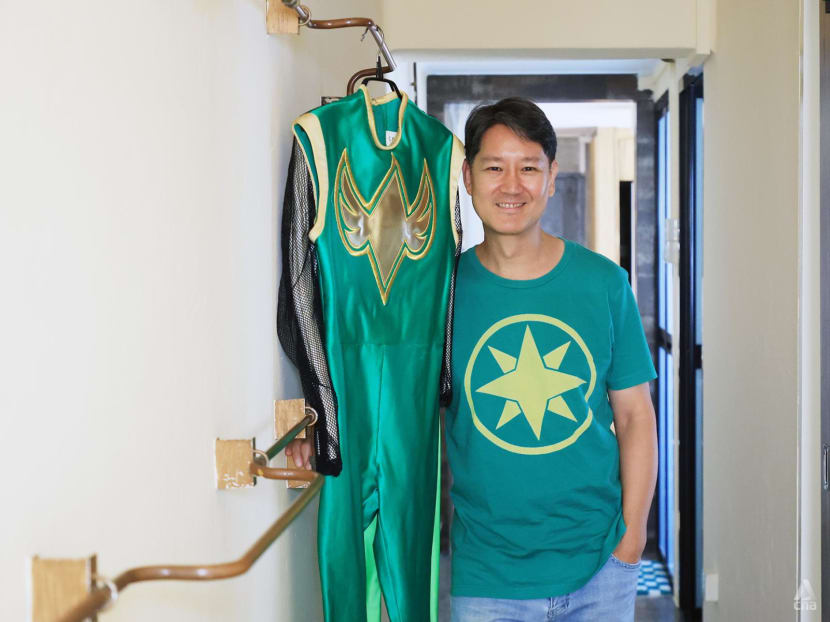
Mr Jason Chan, who played the Green Samurai Ranger in a season of the popular Power Rangers television franchise, at his home on Aug 12, 2025. He still keeps his original costume, though admits it no longer fits. (Photo: CNA/Ooi Boon Keong)

This audio is generated by an AI tool.
More than two decades after Jason Chan first donned the iconic Power Ranger suit, the 54-year-old still gets stopped in the street by fans who recognise him from the hit American live-action television series.
Just last month, Mr Chan was spotted while riding a private bus during a site recce for a work project.
"One of the guys sitting on the bus turned around, and he was whispering to the guy next to him. He said: 'Have you guys ever watched Power Rangers?'" Mr Chan recalled with a laugh.
"And I said: 'I'm right here. I can hear what you're saying.' And he was like: 'I'm so happy to meet you, you were so much a big part of my life growing up'."
Mr Chan's portrayal of Cameron Watanabe – the Green Samurai Ranger – in Power Rangers Ninja Storm (2003), the 11th season of the long-running franchise, has made him a role model for fans worldwide.
Seeing an Asian superhero on screen – especially a "sarcastic, tough and edgy" character like the Green Ranger – was particularly empowering for many Asian viewers at a time when the representation of Asian people on television was scarce, he said.
The American Power Rangers series was based on a Japanese series.
After starring in just one season, the Malaysian-born Australian relocated to Singapore in 2006, spending the next two decades largely out of the Power Rangers spotlight.
But a recent return to the public eye – this time on TikTok – has revived memories of his TV role. While promoting Cinewav, the audio-tech firm he co-founded, Mr Chan began posting social media clips that unexpectedly sparked a wave of recognition from fans who grew up watching him.
When we met for a sit-down interview at his home on Tuesday (Aug 13), he was wearing a green Power Ranger T-shirt – a fan-made design gifted from the United States.
In a corner of his living room sat a box of Power Rangers toys given to him by Disney – the show's production company then – on his last day of filming.
Mr Chan noted that Power Rangers was created by a toy manufacturer as a way to add a storyline to its products and boost sales, with related toys racking up tens of millions of dollars over the years.
Gingerly lifting the helmet off one of his Green Ranger figurines, he revealed it had been modelled on him. The designer, he said, had studied photographs of him, sculpted his face in clay, and fine-tuned the details before it went into production.
Peppered throughout his home are items of Power Rangers memorabilia, which he had gathered to show me during the interview. He still keeps his original costume, though admits it no longer fits.
"(Power Rangers) was kind of a catapult onto the world stage, in a way. And afterwards, for the next 20 years since I've done it, I experienced a lot of love from fans of the series."
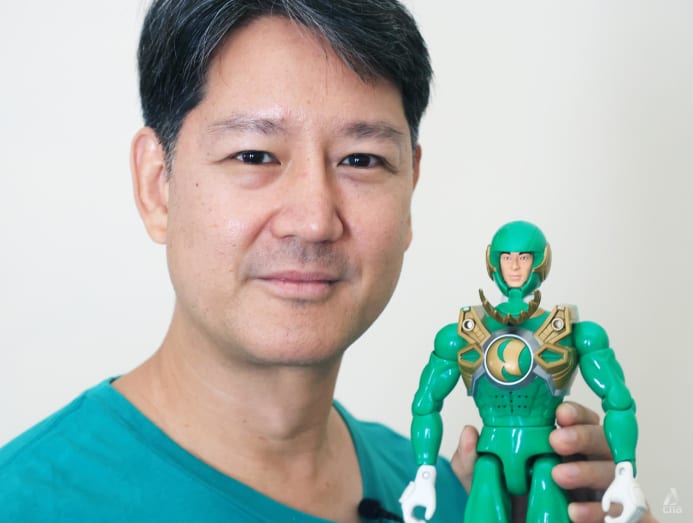
LEFT MEDICINE TO BECOME A POWER RANGER
When Mr Chan was five, he, his parents, older brother and younger sister left Kuala Lumpur, Malaysia for a new life in Perth, Australia.
Growing up, he gravitated towards the arts – playing piano, dancing, acting – and in high school, starred in plays and musicals while taking speech and drama classes.
Cinema also greatly shaped his early years. He borrowed up to 10 movies weekly at the local video library, immersing himself in the magic of film.
Mr Chan however eventually enrolled in medical school – one of three typical pathways among immigrant families in Australia, along with law and business, he said.
While he valued his time in medical school, he admitted it was ultimately not the right fit – a realisation that crystallised during his internship year, when he endured gruelling 80-hour weeks under immense pressure.
"And I remember every night doing these 16-hour shifts. I would sit up on the bench by myself at the quietest time of the night, at 3am, and I was like: why am I doing this? There's nothing creative in this at all. You can't use any of your creativity that you grew up with."
As an escape, he began taking night acting classes twice a week while still in medical school.
"I couldn't stop talking about it (the classes) to my acting friends," Mr Chan recalled. "We would be out in the car park talking about the classes till 2am or 3am. That's when I knew: this is my passion, this is really what I want to do."
Still, he graduated with a medical degree in 1994, and worked as a doctor for three years.
Unable to shake the feeling of being unfulfilled, he enrolled in a three-year full-time Bachelor's programme at the renowned National Institute of Dramatic Art in Sydney, which has trained stars including Cate Blanchett and director Baz Lurhmann. He kept working as a locum doctor on weekends to pay the bills.
Mr Chan recalled an acting school auditioner telling him they would never normally encourage someone to leave a "good profession" like medicine for the "horrible" world of acting.
But there are exceptions, the auditioner had said. Some people are born to act and if they don't express what they have to say, it will bug them for the rest of their lives.
"(The conversation) just hit home to me, and I said, yeah, that's me. I've just got something to say," said Mr Chan.
Looking back, he said many had asked if the pivot to acting was difficult, or if he regretted it.
"And my answer to that is that it was incredibly easy, because I was miserable on one side and so incredibly happy when I had no money, living in a run-down house with mold, living off 50 dollars a week at acting school, crawling around the floor in acting exercises all week," he said.
Acting school, Mr Chan said, was also a way for aspiring actors like him to get noticed and land their first roles. Close to graduation, each student performs before casting agents.
As a result, Mr Chan landed his first contract with Disney as a host in its children's television show Playhouse Disney. A year later, he auditioned for Power Rangers.
When the offer came, he was thrilled. But the filming schedules clashed, forcing him to choose one over the other.
"I told my agent: you know, every boy wants to be a superhero. I don't think I'll ever get this opportunity again, let alone, to play a lead role in a TV show in America," said Mr Chan.
While his agent double-checked if he wanted the role – warning he might be typecast as it was a "B-grade kids' show" – Mr Chan recalled watching the 1995 Power Rangers movie near the end of high school and knew he wanted to take it.
"(The film) was just these kids in spandex running around a city kicking monsters' butts, and most of those monsters looked very PVC-ish in rubber suits. And I just thought, that's amazing – I love it and I totally want to do that."
Taking the role, he spent a year filming in New Zealand.
Looking at the thick, multi-layered lycra suit hanging nearby, I ran my fingers over the fabric as Mr Chan recalled his first time donning the bright green costume. It was stiflingly hot, especially while filming in a non-airconditioned warehouse during the country's warmer months, he said.
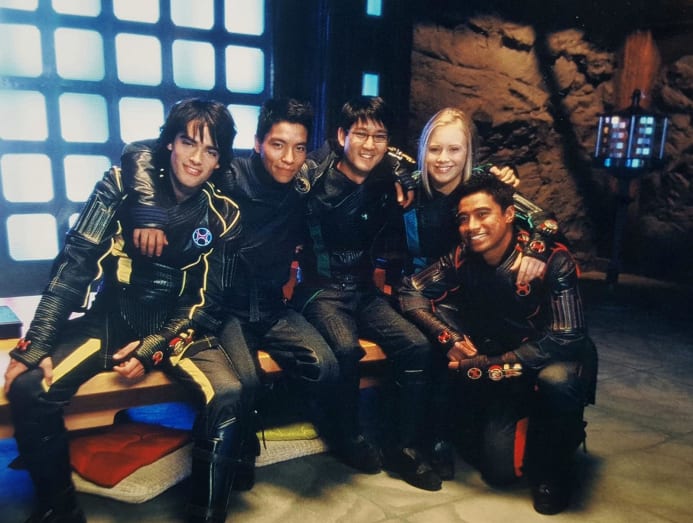
To prepare themselves for the role, the cast trained with a Japanese stunt team who had worked for Hong Kong martial artist and actor Jackie Chan.
"They put us through boot camp for two weeks and after the first day, a few of us literally couldn't walk," he said.
When filming wrapped, Mr Chan asked if he could keep a Green Power Ranger suit as a memento. Though it was against Disney's protocol and the costume department initially hesitated, his rapport with the team paid off – and he cheekily recalled how the head of costume "turned his eyes" as he took it.
As for his parents, they were not thrilled at first about him giving up medicine for acting, though they felt reassured after seeing the acting school's notable alumni.
"I think the hope was that I'd always come back (to medicine). But really, after Power Rangers, I was gone. I was like: this is what I want to do. This is fun," said Mr Chan.
For years, he didn't consider himself famous. While the show aired in the US and fan mail came in, he was still filming in Auckland, New Zealand, where no one recognised them.
It wasn't until attending the official Power Rangers convention in Los Angeles last year that he realised the show's reach. Thousands queued to meet him and his co-stars, some even tearing up as they spoke about bonding with family over the show each week.
At the time, however, the role did not open many doors in Australia. It wasn't aired on free-to-air television there – a decision he suspects was due to concerns over its arguably violent content.
Mr Chan also struggled with stereotyped roles offered to Asian actors, including parts requiring speaking broken English, which he found disappointing.
Then, a family friend in Singapore who was a casting agent offered to represent him here – prompting his move to Singapore in 2006.
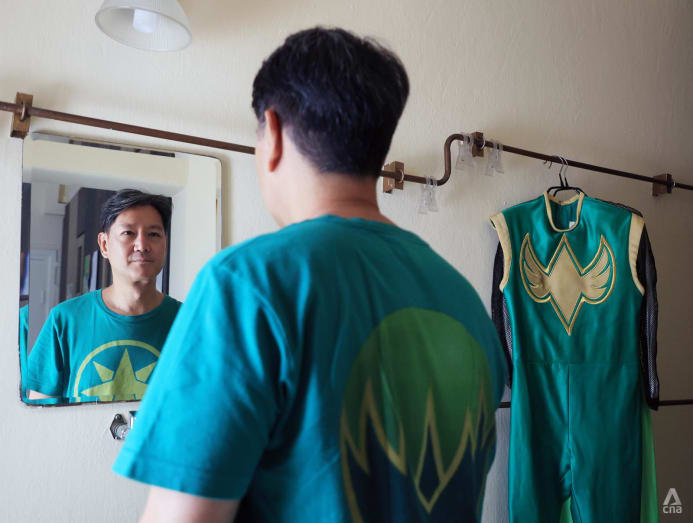
LIFE IN SINGAPORE
In Singapore, Mr Chan's career quickly gained momentum – not from Power Rangers fame, but because being in an Asian country opened doors to lead roles.
Having mostly auditioned for minor parts in Australia, he suddenly found himself considered for romantic leads and main characters, landing "pretty major" roles in the local sitcom My Sassy Neighbour, the 2008 romance film The Leap Years, and a stage musical.
While sharing an apartment with other actors, Mr Chan met fellow actor Christian Lee, an American.
Bonding over their love for the craft and frustration with the limitations they faced as actors, they co-founded the video production firm BananaMana Films in 2009, stepping away from acting to produce short films online.
"(We) weren't always happy as actors being in the shows that we were in. We always thought, 'oh, we can do better'. And of course, when we started we couldn't do better at all – we were horrible," said Mr Chan with a laugh.
But the duo persevered, teaching themselves how to operate cameras, handle audio, write scenes and everything in between.
"We did a lot of skits and short films that were, to this day, just horrific. But we've kept them up online, just to remind ourselves and other people that you have to start somewhere."
Their work eventually caught the eye of filmmaker and then-Mediacorp commissioning editor Lionel Chok.
This led to the creation of What Do Men Want, a 13-episode drama-comedy on Toggle, Mediacorp's newly launched digital platform at the time. It was produced on a modest budget and tight timelines.
As they began weighing different projects, they shifted their mindset from asking: "Would we do this for free?" to "Would we pay for the opportunity to do this?"
This mantra made them more selective about what they took on, and in 2014 they channelled their energy into a passion project – the short-form web series Perfect Girl, made for just S$5,000 (US$3,900).
The show won multiple awards – including at the Los Angeles Web Series Festival – holding its own against productions with far larger budgets.
It was also picked up by regional streaming platform Viki. Then a few months later, Netflix acquired the rights, making Perfect Girl the first Singaporean drama on the global streaming giant.
Building on that success, the duo produced Jimami Tofu in 2017, a feature film promoting Okinawa to Singaporeans. Rather than creating a standard tourism piece, they wrote it as a romance woven with traditional Okinawan cuisine and Ryukyu culture.
The film became the longest-running independent release at Golden Village cinemas, screening for two-and-a-half years until the COVID-19 pandemic, said Mr Chan.
He claimed the film even inspired Jetstar Asia's first direct flight from Okinawa to Singapore, after the airline's head of business development attended its preview.
Before the film's theatrical debut, Mr Chan and Mr Lee hosted an outdoor screening at the Singapore Botanic Gardens – an event that sparked their next big idea.
Then, they noticed a recurring issue with outdoor cinema: most relied on external speakers, resulting in compromised sound quality that, they felt, diminished the immersive experience.
"We broke the record for the number of people coming out to the Botanic Gardens for a movie screening, and it was beautiful. Everything was amazing, except for the fact that the sound, for us, was horrible," he said.
"You can't scale good quality surround sound to 2,000 people. It becomes reverberant, echoey, unbalanced."
The pair worked with developers to create a solution.
The result was Cinewav, an audio-tech startup that lets audiences plug in their own earphones to stream high-quality, synchronised audio from their smartphones – transforming outdoor viewing without the need for loudspeakers, and also reducing noise complaints from nearby residents.
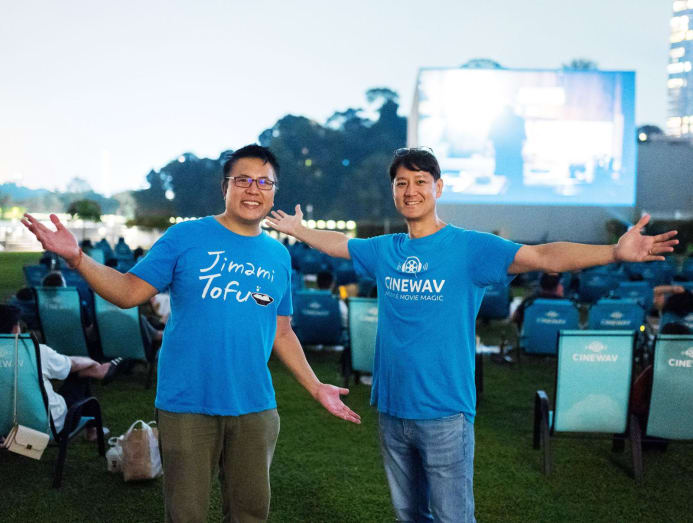
They refined the technology over time, eventually patenting it in five countries: Singapore, the US, Britain, Japan and South Korea. It was, as Mr Chan quipped, like "a cinema in a backpack".
They are looking to create works for various mediums, and have already begun projecting onto trees.
More importantly, they see Cinewav as a way to build and transform communities, and have been donating screens to low-income neighbourhoods overseas.
In Singapore, they power free screenings at the Enabling Village, Somerset Youth Park, migrant worker dormitories and in public housing estates.
On the journey ahead, Mr Chan said: "We always look back and go: 'look where we were five years ago, look where we were 10 years ago. That was a crappy little online video we made.' And we've come this far, and we get there from always just putting one foot in front of the other."













